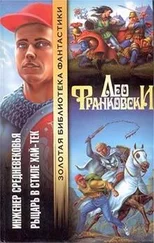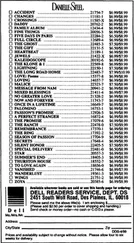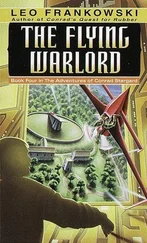Лео Франковски - The High-Tech Knight
Здесь есть возможность читать онлайн «Лео Франковски - The High-Tech Knight» весь текст электронной книги совершенно бесплатно (целиком полную версию без сокращений). В некоторых случаях можно слушать аудио, скачать через торрент в формате fb2 и присутствует краткое содержание. ISBN: , Жанр: Альтернативная история, на английском языке. Описание произведения, (предисловие) а так же отзывы посетителей доступны на портале библиотеки ЛибКат.
- Название:The High-Tech Knight
- Автор:
- Жанр:
- Год:неизвестен
- ISBN:0-345-32763-2
- Рейтинг книги:4 / 5. Голосов: 1
-
Избранное:Добавить в избранное
- Отзывы:
-
Ваша оценка:
- 80
- 1
- 2
- 3
- 4
- 5
The High-Tech Knight: краткое содержание, описание и аннотация
Предлагаем к чтению аннотацию, описание, краткое содержание или предисловие (зависит от того, что написал сам автор книги «The High-Tech Knight»). Если вы не нашли необходимую информацию о книге — напишите в комментариях, мы постараемся отыскать её.
The High-Tech Knight — читать онлайн бесплатно полную книгу (весь текст) целиком
Ниже представлен текст книги, разбитый по страницам. Система сохранения места последней прочитанной страницы, позволяет с удобством читать онлайн бесплатно книгу «The High-Tech Knight», без необходимости каждый раз заново искать на чём Вы остановились. Поставьте закладку, и сможете в любой момент перейти на страницу, на которой закончили чтение.
Интервал:
Закладка:
It was weeks before I discovered that the people thought that the food was wonderful! They actually got enough to eat!
Keeping track of so many people was beyond my ability, so at supper I called Natalia aside. She had very good handwriting and was one of those compulsively neat people who make good secretaries and clerks.
"Natalia, I have a special job for you. I want records kept on everybody here. I want a separate sheet of parchment for every man. Put down his name and the names of his parents and his grandparents and as far back as he knows. Put down his wife's name and her ancestor's names and their children's names. I want to know everybody's age, when and where they were born and married and when we hired them. And write small, because we'll be adding things later."
"All that? Why do you want to write such things down? If you need to know, why not ask them yourself?"
"Because I don't have time to, and I couldn't remember it all anyway."
"Why should anybody have to remember all that?"
"Pay records, for one thing. How can I remember how much I owe each man?"
"Pay them every night or every week and then you don't have to remember it."
"That would be very time-consuming. Everyone would have to stand in line for an hour every day. I am talking about permanent records. It is important that we know everything about our people."
"We can't know everything. Only God in heaven knows everything."
I tried two or three other lines of argument, and always ran up against the same unshakable logic. But there are more ways than logic to get your way.
"Natalia, would you please do this for me as a favor?"
"Why, of course, Sir Conrad! You know I'd do anything for you."
So Natalia became our records-keeper and eventually my secretary, but she still thought records were a silly waste of parchment. But these would be permanent records and records are important. Aren't they?
By nightfall, the camp had some semblance of order. I had a hut of my own, thatched with pine boughs. There was one for Vladimir and a third for our spare ladies. I'd told them to make two latrines and they'd assumed that I meant one for nobility and one for commoners, rather than one for men and one for women. But there was no point in arguing about it.
Everyone else had at least room under a roof. All told, I was pleased with our accomplishments, considering that we had started out with nothing but a mob of wretched, underfed people without enough sleep.
In the morning, I left with Yawalda and one of the men for Sir Miesko's manor to buy food. I bought grain, eggs, and veggies and made arrangements for my man to come by three times a week for more supplies. I also bought a milk cow, the only one available, which was a mistake.
It was dark before we got the silly animal back to camp and we had to stop and squirt the milk on the ground because we didn't have a bucket with us and I refused to lend my helmet for the purpose. At that, we were lucky, since Yawalda knew how to milk a cow and neither of us men did. I didn't even know why it was bawling and refusing to move. The joys of the pastoral
By the end of the next day, they had built a complete, If rustic village. The blacksmith was set up and making barrel hoops for the brewery and the masons were cutting a huge millstone that would be turned by two mules. Carpenters were at work making a gross of beehives. There was a hut for every family and all the outbuildings we needed for storage, cooking, and eating. We even had tables and benches, made from split logs, under the dining pavilion and enough new bowls, trenchers (a sort of board you ate off of), and spoons to go around. It is amazing how much six hundred people can accomplish when they're motivated.
There were splinters in everything, of course, and enough wood chips to pave the place, which was exactly what we used them for.
The next day was Sunday, and that afternoon Sir
Miesko's village priest showed up and said mass under the dining pavilion.
Anna watched the mass intently and came closer to listen to the sermon. Thereafter, each week she became more interested and was soon kneeling, sitting, and standing with the faithful.
The priest was obviously disconcerted, but didn't know how to bring up the subject of a church-going horse.
Just as well, because I didn't have any answers.
Interlude One
I hit the STOP button.
"Tom, that horse is one of your critters, isn't it?"
"She's an intelligent bioengineered creation of my labs, if that's what you mean."
"Then what's an old atheist like you doing designing religious animals?"
"In the first place, Anna's not an animal in the sense you're using the word. She's intelligent. In the second, I didn't design her. That sort of thing takes a big staff a long time to do. And in the third place, it was as big a surprise to me as it was to you."
"It was?"
"Those horses are very literal-minded. They will always take every word that an authority figure says as the absolute truth. Nobody ever thought that one of them would be told deliberate lies."
"Tom, you're an old heathen!"
"I'm also your boss and your father. Now shut up."
He hit the START button.
Chapter Six
FROM THE DIARY OF CONRAD SCHWARTZ
I hadn't thought to pay anybody, so none of the people had any money. The collection basket came back empty. To cover the embarrassment, I paid the priest. This set another precedent. Conrad pays the priest.
Now we could get down to real work, building permanent housing and getting the valley productive. I put the masons and the miners to enlarging the old mine shaft. Medieval miners cut shafts that were barely crawlspaces. I wanted the shaft big enough for a man to work in and there had to be room for a steam suction pump.
Thus far, I'd let the carpenters build whatever they liked, since it was all only temporary. But I had some definite ideas about what I wanted for the permanent buildings.
The valley had about a square kilometer of flat land and was surrounded by a sloping wall that eventually became quite steep. The only entrance was between two cliffs about two hundred yards apart. The obvious structure to build was a combination apartment house and defensive wall between them, about six stories tall. It would have to be of wood, of course, good enough against animals and thieves but worthless against Mongols. But the cliffs were more than two hundred meters long and the land sloped down considerably as the cliffs fanned out. We could build now at the narrowest point and later build another wall, or several walls, that were taller and made of masonry.
I knew we had coal and limestone and that meant that we could make mortar with existing technology. I was confident that with clay and sand and much higher temperatures, we could make cement and with that we had concrete!
Enough concrete will stop anybody.
The valley was filled with huge trees. Oh, nothing like what you would find on the west cost of America, but hundreds of them were well over two yards thick at the base. Poland had many such trees at the time and for a very good reason.
It was extremely difficult to fell a really big tree with only axes. Once you did have it down, without machinery it was very hard to move. For the small groups of woodcutters common at the time, it was impossible.
And then, what could you do with it? Medieval Poles made boards by splitting logs and then planing the wood smooth. That doesn't work on a log that is as big around as you are tall.
For many centuries, they left the big trees alone and took only the small ones.
I'd had a dozen steel crosscut saws and ripsaws made, some of them four yards long. We had big timber, and fasteners were very expensive. The price of nails was absurd. But the bigger the parts, the fewer the fasteners. My plans called for the floors, doors, and shutters to be made with wood slabs a yard wide and the outer walls of boards a yard wide and a half-yard thick with the bark left on. It would be good insulation and indestructible except by fire.
Читать дальшеИнтервал:
Закладка:
Похожие книги на «The High-Tech Knight»
Представляем Вашему вниманию похожие книги на «The High-Tech Knight» списком для выбора. Мы отобрали схожую по названию и смыслу литературу в надежде предоставить читателям больше вариантов отыскать новые, интересные, ещё непрочитанные произведения.
Обсуждение, отзывы о книге «The High-Tech Knight» и просто собственные мнения читателей. Оставьте ваши комментарии, напишите, что Вы думаете о произведении, его смысле или главных героях. Укажите что конкретно понравилось, а что нет, и почему Вы так считаете.










